“Manbulloo was established in 2005 and has one mango farm at Katherine, in the Northern Territory, two near Townsville, and one inland from Cairns. Due to the strong domestic and export demand, Manbulloo is increasing the number of mango trees by 50% at the Katherine farm and, in November 2016, purchased the 3rd farm in Queensland. 20% of the crops are R2E2 mango and 80% are Kensington Pride(KP) mangoes," explains Scott Ledger, Senior Horticulturist at Manbulloo.
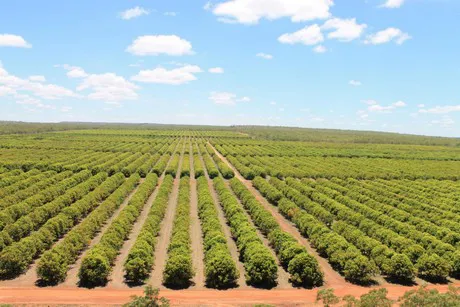
Manbulloo Katherine farm
Manbulloo have a packing house at the Katherine farm and a packing house and VHT (Vapor Heat Treatment) plant near Townsville. Their major domestic customer is Coles Supermarket who we supply exclusively with the Manbulloo brand. Part of the crop is exported to customers in the Northern Hemisphere, with Korea and China the major markets. All mangoes are exported through Manbulloo’s own export company, Mango Road.
The 2016 mango season will start with the KP variety at the end of September for the domestic market. And R2E2 will normally start 10-14 days after the KP.
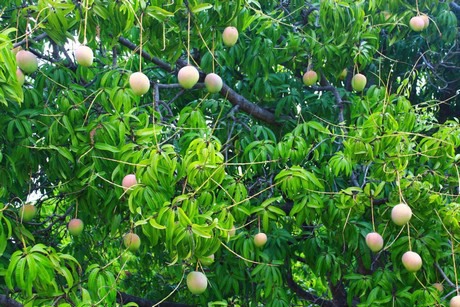
KP mangoes ready to harvest
Insisting on official export for 9 years
“Manbulloo has been exporting to China for nine years. We are one of only two companies in Australia who have VHT facilities. The other facility is owned by a Japanese company who focus on the Korean and Japanese markets. Since the Japanese company does not own a mango farm in Australia, they have to buy mangoes from our farmers,” according to Scott.
“Our Chinese export business grew slowly in the first 6 years, but the volume tripled in 2013/14. The main reason is that demand for officially imported mangoes increased a lot. We know large volumes of Australian mangoes enter the mainland China market through unofficial channels. But we don’t think that’s the right way to grow the market for Australian mangoes, especially as Chinese Customs have been implementing an increasingly stricter policy on imported fruits in recent years. What’s more, after China and Australia signed a Free Trade Agreement, tariffs on Australian mangoes have decreased from 15 to 9% in the past 2 years and will be at zero by January 2019. We believe that, in the near future, mangoes from official channels will become more and more competitive."
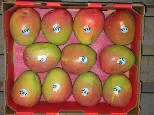 VHT will NOT hurt mango quality
VHT will NOT hurt mango qualityOne reason importers haven’t chosen the official channel for mangoes in the past is because they worry that the quality or shelf live could be influenced by the VHT (Vapour Heat Treatment).
“Actually VHT does not influence mango quality. First, before VHT, we do sorting to guarantee mango quality. Only mangoes that have a pink blush (pink area should be above 25%) and no major skin defects are sent to VHT,” said Scott.
“Secondly, VHT is used to control fruit fly and other pests with high temperature and humidity. When mangoes are loaded into the VHT room, the fruit temperature is 30℃ (the same as the outside environment temperature). The quarantine regulation requires the mango to be heated to 47℃ and held for 15 minutes. It takes approximately 6 hours to heat the mango to 47℃ and then 2 hours to cool the fruit down to 23℃."
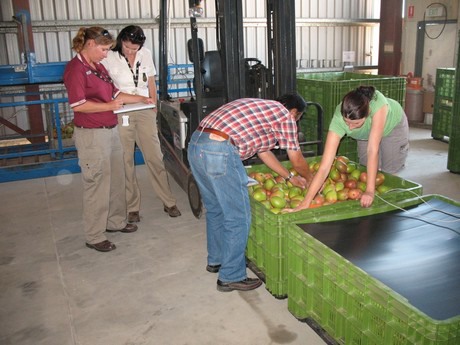
Inserting temperature probes in fruit before VHT
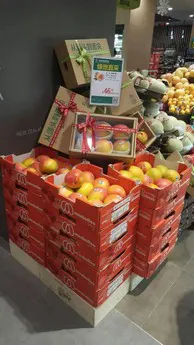 Programme supported by Government
Programme supported by GovernmentThis season, Manbullo's mango export programme will be supported by Horticulture Innovation Australia and the Department of Agriculture and Fisheries of Queensland and other organisations.
The programme will last for 5 years and aims to improve the arrival quality of Australian fruits and vegetables. Mangoes from Manbulloo have been selected as the first product to start this programme.
In the coming export season, temperature and humidity monitoring devices will be installed in exported mango cartons. Related data from freight to retail will be recorded and collected. Then the company will adjust their export process and give more advice to importers and retailers accordingly. "We think this programme is quite significant for the Australian fresh produce industry. It will help a lot to decrease waste and further improve the reputation of Australian fresh produce products in overseas markets."
Innovations in the coming export season
“We are very excited about the coming export season as we trying out a couple of innovations, such as the KP variety and a Chinese e-commerce channel," explains Scott.
"In the past few years, Asian markets have mainly imported R2E2 mangoes from Australia. But we think KP will deliver a new and delicious taste experience for Chinese consumers. It is Australia's favourite mango and with its pink skin and medium size, the KP mango should be accepted and liked by Chinese customers. So this season we will try to export some KP mangoes to the China market and monitor customer feedback."

Scott and Mr. Shi, importer from Shanghai
"We will try to cooperate with a Chinese e-commerce Channel this time. Since mango is very sensitive to temperature and bruising, we need to supply directly to e-commerce businesses, rather than through wholesale markets, to maintain fruit quality all the way to the consumer. In this way, customers can try fresh mangoes and receive a more reliable taste experience."
"According to our plan, the first air shipments of mangoes will arrive in Shanghai, Beijing and Guangzhou at the end of October. We hope customers in China will fall in love with Manbulloo mangoes – Australia's finest mangoes.”
For more information:
Scott Ledger
Manbulloo Mangoes
Tel: +61 7 3318 4013
Email: sledger@hortvcgroup.com.au
